Organisational Culture, Motivation, and Team Performance Report
VerifiedAdded on 2023/06/18
|17
|5055
|76
Report
AI Summary
This report delves into the intricate relationship between organisational culture, power dynamics, politics, and workforce motivation, using Marks & Spencer as a case study. It analyses how these factors impact individual and team behaviour and performance. Various motivational theories, including Maslow's hierarchy of needs and Herzberg's two-factor theory, are discussed in relation to achieving organisational goals. The report also examines the characteristics of effective teams and evaluates team development theories. Furthermore, it applies organisational behaviour concepts and philosophies to a given business situation, critically evaluating their influence on workplace productivity and overall success. The report concludes by emphasizing the importance of aligning organisational culture and motivational strategies to foster a positive and productive work environment.
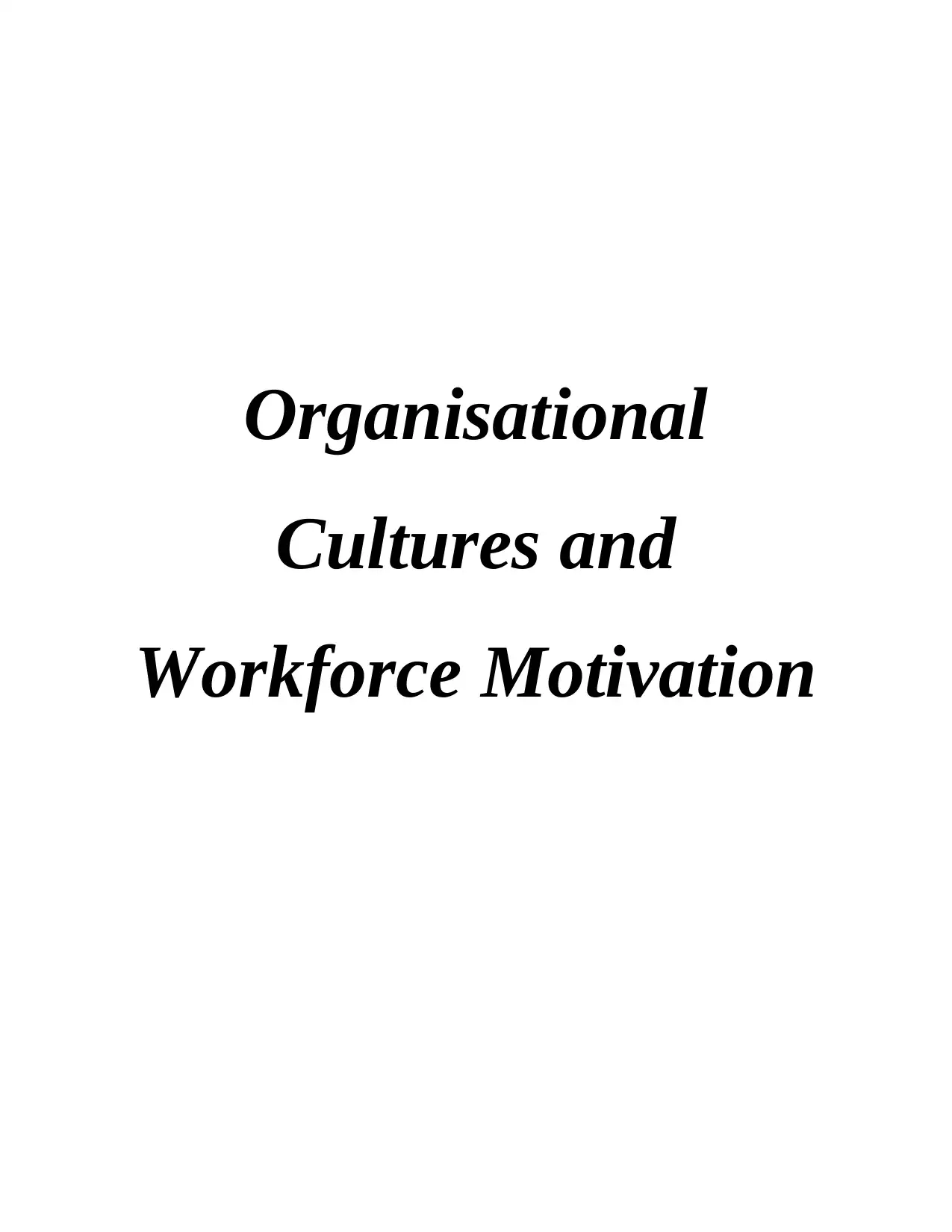
Organisational
Cultures and
Workforce Motivation
Cultures and
Workforce Motivation
Paraphrase This Document
Need a fresh take? Get an instant paraphrase of this document with our AI Paraphraser

Table of Contents
INTRODUCTION ..........................................................................................................................4
TASK...............................................................................................................................................4
P1 Effect of culture, politics and power of organisation on individual and team behaviour and
performance.................................................................................................................................4
M1 Critically analyse the way organisational culture, power and politics can affect the
performance of individual and team behaviour..........................................................................6
P2 Discussion of theories of motivation which implies effect on the achievement of
organisational goals.....................................................................................................................6
M2 Critically analyse the way to influence behaviour of others by using behavioural motivate
theories and models.....................................................................................................................9
D1 Critically analyse the relationship in between the culture, politics and power and
motivation that helps to team and organisation in success by giving recommendations............9
P3 Explain what makes an effective team as opposed to an ineffective team..........................10
M3 Evaluate relevant team and group development theories to assist development of
cooperation of effective team....................................................................................................11
P4 Apply concepts and philosophies of organisational behaviour within an organisational
context and given business situation.........................................................................................11
M4 Evaluate way concepts and philosophies of OB influence within the given business
situation.....................................................................................................................................13
D2 Critically evaluate the importance to team development theories that influence the
behaviour in work place to improve productivity.....................................................................13
CONCLUSION .............................................................................................................................14
REFERENCES..............................................................................................................................15
INTRODUCTION ..........................................................................................................................4
TASK...............................................................................................................................................4
P1 Effect of culture, politics and power of organisation on individual and team behaviour and
performance.................................................................................................................................4
M1 Critically analyse the way organisational culture, power and politics can affect the
performance of individual and team behaviour..........................................................................6
P2 Discussion of theories of motivation which implies effect on the achievement of
organisational goals.....................................................................................................................6
M2 Critically analyse the way to influence behaviour of others by using behavioural motivate
theories and models.....................................................................................................................9
D1 Critically analyse the relationship in between the culture, politics and power and
motivation that helps to team and organisation in success by giving recommendations............9
P3 Explain what makes an effective team as opposed to an ineffective team..........................10
M3 Evaluate relevant team and group development theories to assist development of
cooperation of effective team....................................................................................................11
P4 Apply concepts and philosophies of organisational behaviour within an organisational
context and given business situation.........................................................................................11
M4 Evaluate way concepts and philosophies of OB influence within the given business
situation.....................................................................................................................................13
D2 Critically evaluate the importance to team development theories that influence the
behaviour in work place to improve productivity.....................................................................13
CONCLUSION .............................................................................................................................14
REFERENCES..............................................................................................................................15

⊘ This is a preview!⊘
Do you want full access?
Subscribe today to unlock all pages.

Trusted by 1+ million students worldwide

INTRODUCTION
The organisation behaviour is the study of the human behaviour in organisational
settings. It is directly concerned with the understanding, prediction and control of human
behaviour in the organisation. It study the group and individual performance within the
organisation. The organisation behaviour is also defined as the study and application of
knowledge related to human behaviour. The company is influenced with the organisation culture,
structure and politics. Motivation in the workplace is considered as an important factor which
helps in improving the employee performance and motivates them to work efficiently (Ahmed,
H.A and et.al., 2019). To create the interrelationship between the organisation and employees
various strategies are developed in the company. The study is been on the Marks and Spencer
which is a multinational retailer of clothing, food products and home products having
headquarter in London, England, United Kingdom. This was established in 1884 by Michael
Marks and Thomas Spencer. In the report the discussion is made on affect of power, culture and
politics of organisation on team behaviour and performance. The motivational theories and
techniques is evaluated. The understanding is made how to cooperate effectively and applying
the philosophies of organisation behaviour on business.
TASK
P1 Effect of culture, politics and power of organisation on individual and team behaviour
and performance.
The organisation behaviour involves the individual, team behaviour and the performance
which directly have impact on the organisation culture, politics and power which is associated
with the environment. The organisation culture refers the proper way to behave within the
organisation which comprises of shared beliefs and attitude of the customer. To have the
business success the organisation culture is the key for developing traits. The organisation
culture is the collection of the expectations, values, and practices which guides and inform the
actions of all team members (Ayuso, S. and Navarrete‐Báez, F.E., 2018). The positive culture
improves the performance and leads to growth which increases employee attention. In context to
Marks and Spencer the behaviour of the people is governed. In the organisation culture the
Charles handy model is explained born in 1932 who has described culture in four types.
The organisation behaviour is the study of the human behaviour in organisational
settings. It is directly concerned with the understanding, prediction and control of human
behaviour in the organisation. It study the group and individual performance within the
organisation. The organisation behaviour is also defined as the study and application of
knowledge related to human behaviour. The company is influenced with the organisation culture,
structure and politics. Motivation in the workplace is considered as an important factor which
helps in improving the employee performance and motivates them to work efficiently (Ahmed,
H.A and et.al., 2019). To create the interrelationship between the organisation and employees
various strategies are developed in the company. The study is been on the Marks and Spencer
which is a multinational retailer of clothing, food products and home products having
headquarter in London, England, United Kingdom. This was established in 1884 by Michael
Marks and Thomas Spencer. In the report the discussion is made on affect of power, culture and
politics of organisation on team behaviour and performance. The motivational theories and
techniques is evaluated. The understanding is made how to cooperate effectively and applying
the philosophies of organisation behaviour on business.
TASK
P1 Effect of culture, politics and power of organisation on individual and team behaviour
and performance.
The organisation behaviour involves the individual, team behaviour and the performance
which directly have impact on the organisation culture, politics and power which is associated
with the environment. The organisation culture refers the proper way to behave within the
organisation which comprises of shared beliefs and attitude of the customer. To have the
business success the organisation culture is the key for developing traits. The organisation
culture is the collection of the expectations, values, and practices which guides and inform the
actions of all team members (Ayuso, S. and Navarrete‐Báez, F.E., 2018). The positive culture
improves the performance and leads to growth which increases employee attention. In context to
Marks and Spencer the behaviour of the people is governed. In the organisation culture the
Charles handy model is explained born in 1932 who has described culture in four types.
Paraphrase This Document
Need a fresh take? Get an instant paraphrase of this document with our AI Paraphraser
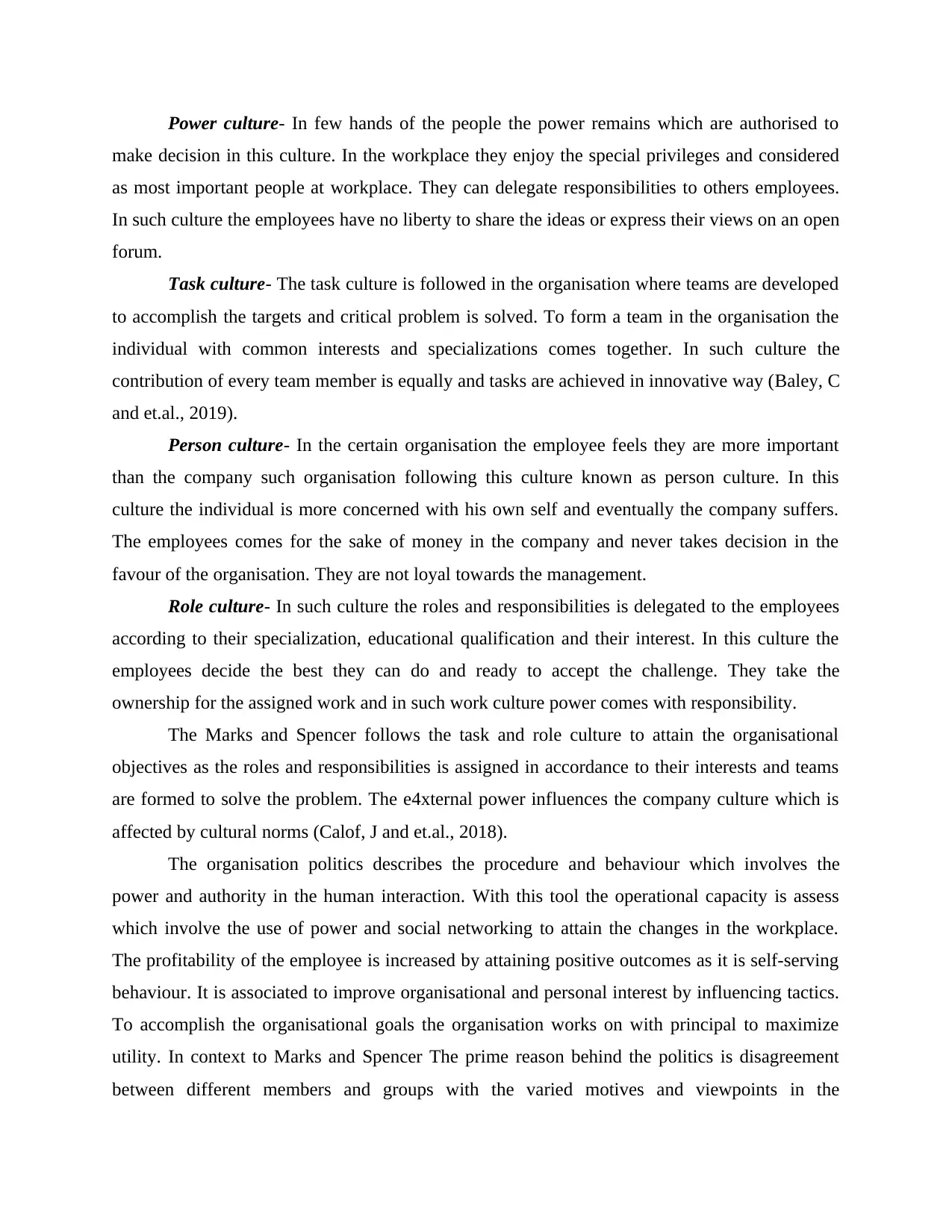
Power culture- In few hands of the people the power remains which are authorised to
make decision in this culture. In the workplace they enjoy the special privileges and considered
as most important people at workplace. They can delegate responsibilities to others employees.
In such culture the employees have no liberty to share the ideas or express their views on an open
forum.
Task culture- The task culture is followed in the organisation where teams are developed
to accomplish the targets and critical problem is solved. To form a team in the organisation the
individual with common interests and specializations comes together. In such culture the
contribution of every team member is equally and tasks are achieved in innovative way (Baley, C
and et.al., 2019).
Person culture- In the certain organisation the employee feels they are more important
than the company such organisation following this culture known as person culture. In this
culture the individual is more concerned with his own self and eventually the company suffers.
The employees comes for the sake of money in the company and never takes decision in the
favour of the organisation. They are not loyal towards the management.
Role culture- In such culture the roles and responsibilities is delegated to the employees
according to their specialization, educational qualification and their interest. In this culture the
employees decide the best they can do and ready to accept the challenge. They take the
ownership for the assigned work and in such work culture power comes with responsibility.
The Marks and Spencer follows the task and role culture to attain the organisational
objectives as the roles and responsibilities is assigned in accordance to their interests and teams
are formed to solve the problem. The e4xternal power influences the company culture which is
affected by cultural norms (Calof, J and et.al., 2018).
The organisation politics describes the procedure and behaviour which involves the
power and authority in the human interaction. With this tool the operational capacity is assess
which involve the use of power and social networking to attain the changes in the workplace.
The profitability of the employee is increased by attaining positive outcomes as it is self-serving
behaviour. It is associated to improve organisational and personal interest by influencing tactics.
To accomplish the organisational goals the organisation works on with principal to maximize
utility. In context to Marks and Spencer The prime reason behind the politics is disagreement
between different members and groups with the varied motives and viewpoints in the
make decision in this culture. In the workplace they enjoy the special privileges and considered
as most important people at workplace. They can delegate responsibilities to others employees.
In such culture the employees have no liberty to share the ideas or express their views on an open
forum.
Task culture- The task culture is followed in the organisation where teams are developed
to accomplish the targets and critical problem is solved. To form a team in the organisation the
individual with common interests and specializations comes together. In such culture the
contribution of every team member is equally and tasks are achieved in innovative way (Baley, C
and et.al., 2019).
Person culture- In the certain organisation the employee feels they are more important
than the company such organisation following this culture known as person culture. In this
culture the individual is more concerned with his own self and eventually the company suffers.
The employees comes for the sake of money in the company and never takes decision in the
favour of the organisation. They are not loyal towards the management.
Role culture- In such culture the roles and responsibilities is delegated to the employees
according to their specialization, educational qualification and their interest. In this culture the
employees decide the best they can do and ready to accept the challenge. They take the
ownership for the assigned work and in such work culture power comes with responsibility.
The Marks and Spencer follows the task and role culture to attain the organisational
objectives as the roles and responsibilities is assigned in accordance to their interests and teams
are formed to solve the problem. The e4xternal power influences the company culture which is
affected by cultural norms (Calof, J and et.al., 2018).
The organisation politics describes the procedure and behaviour which involves the
power and authority in the human interaction. With this tool the operational capacity is assess
which involve the use of power and social networking to attain the changes in the workplace.
The profitability of the employee is increased by attaining positive outcomes as it is self-serving
behaviour. It is associated to improve organisational and personal interest by influencing tactics.
To accomplish the organisational goals the organisation works on with principal to maximize
utility. In context to Marks and Spencer The prime reason behind the politics is disagreement
between different members and groups with the varied motives and viewpoints in the
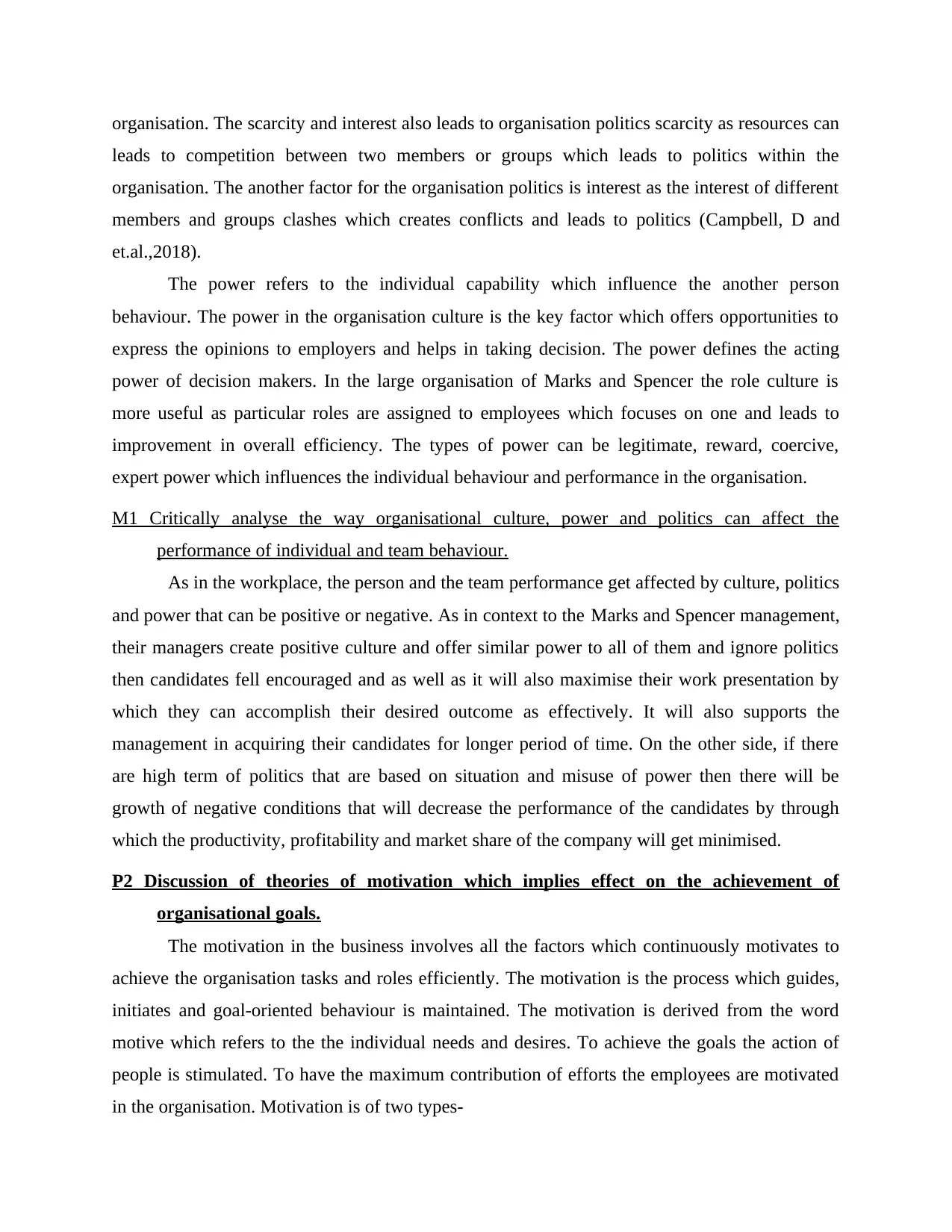
organisation. The scarcity and interest also leads to organisation politics scarcity as resources can
leads to competition between two members or groups which leads to politics within the
organisation. The another factor for the organisation politics is interest as the interest of different
members and groups clashes which creates conflicts and leads to politics (Campbell, D and
et.al.,2018).
The power refers to the individual capability which influence the another person
behaviour. The power in the organisation culture is the key factor which offers opportunities to
express the opinions to employers and helps in taking decision. The power defines the acting
power of decision makers. In the large organisation of Marks and Spencer the role culture is
more useful as particular roles are assigned to employees which focuses on one and leads to
improvement in overall efficiency. The types of power can be legitimate, reward, coercive,
expert power which influences the individual behaviour and performance in the organisation.
M1 Critically analyse the way organisational culture, power and politics can affect the
performance of individual and team behaviour.
As in the workplace, the person and the team performance get affected by culture, politics
and power that can be positive or negative. As in context to the Marks and Spencer management,
their managers create positive culture and offer similar power to all of them and ignore politics
then candidates fell encouraged and as well as it will also maximise their work presentation by
which they can accomplish their desired outcome as effectively. It will also supports the
management in acquiring their candidates for longer period of time. On the other side, if there
are high term of politics that are based on situation and misuse of power then there will be
growth of negative conditions that will decrease the performance of the candidates by through
which the productivity, profitability and market share of the company will get minimised.
P2 Discussion of theories of motivation which implies effect on the achievement of
organisational goals.
The motivation in the business involves all the factors which continuously motivates to
achieve the organisation tasks and roles efficiently. The motivation is the process which guides,
initiates and goal-oriented behaviour is maintained. The motivation is derived from the word
motive which refers to the the individual needs and desires. To achieve the goals the action of
people is stimulated. To have the maximum contribution of efforts the employees are motivated
in the organisation. Motivation is of two types-
leads to competition between two members or groups which leads to politics within the
organisation. The another factor for the organisation politics is interest as the interest of different
members and groups clashes which creates conflicts and leads to politics (Campbell, D and
et.al.,2018).
The power refers to the individual capability which influence the another person
behaviour. The power in the organisation culture is the key factor which offers opportunities to
express the opinions to employers and helps in taking decision. The power defines the acting
power of decision makers. In the large organisation of Marks and Spencer the role culture is
more useful as particular roles are assigned to employees which focuses on one and leads to
improvement in overall efficiency. The types of power can be legitimate, reward, coercive,
expert power which influences the individual behaviour and performance in the organisation.
M1 Critically analyse the way organisational culture, power and politics can affect the
performance of individual and team behaviour.
As in the workplace, the person and the team performance get affected by culture, politics
and power that can be positive or negative. As in context to the Marks and Spencer management,
their managers create positive culture and offer similar power to all of them and ignore politics
then candidates fell encouraged and as well as it will also maximise their work presentation by
which they can accomplish their desired outcome as effectively. It will also supports the
management in acquiring their candidates for longer period of time. On the other side, if there
are high term of politics that are based on situation and misuse of power then there will be
growth of negative conditions that will decrease the performance of the candidates by through
which the productivity, profitability and market share of the company will get minimised.
P2 Discussion of theories of motivation which implies effect on the achievement of
organisational goals.
The motivation in the business involves all the factors which continuously motivates to
achieve the organisation tasks and roles efficiently. The motivation is the process which guides,
initiates and goal-oriented behaviour is maintained. The motivation is derived from the word
motive which refers to the the individual needs and desires. To achieve the goals the action of
people is stimulated. To have the maximum contribution of efforts the employees are motivated
in the organisation. Motivation is of two types-
⊘ This is a preview!⊘
Do you want full access?
Subscribe today to unlock all pages.

Trusted by 1+ million students worldwide
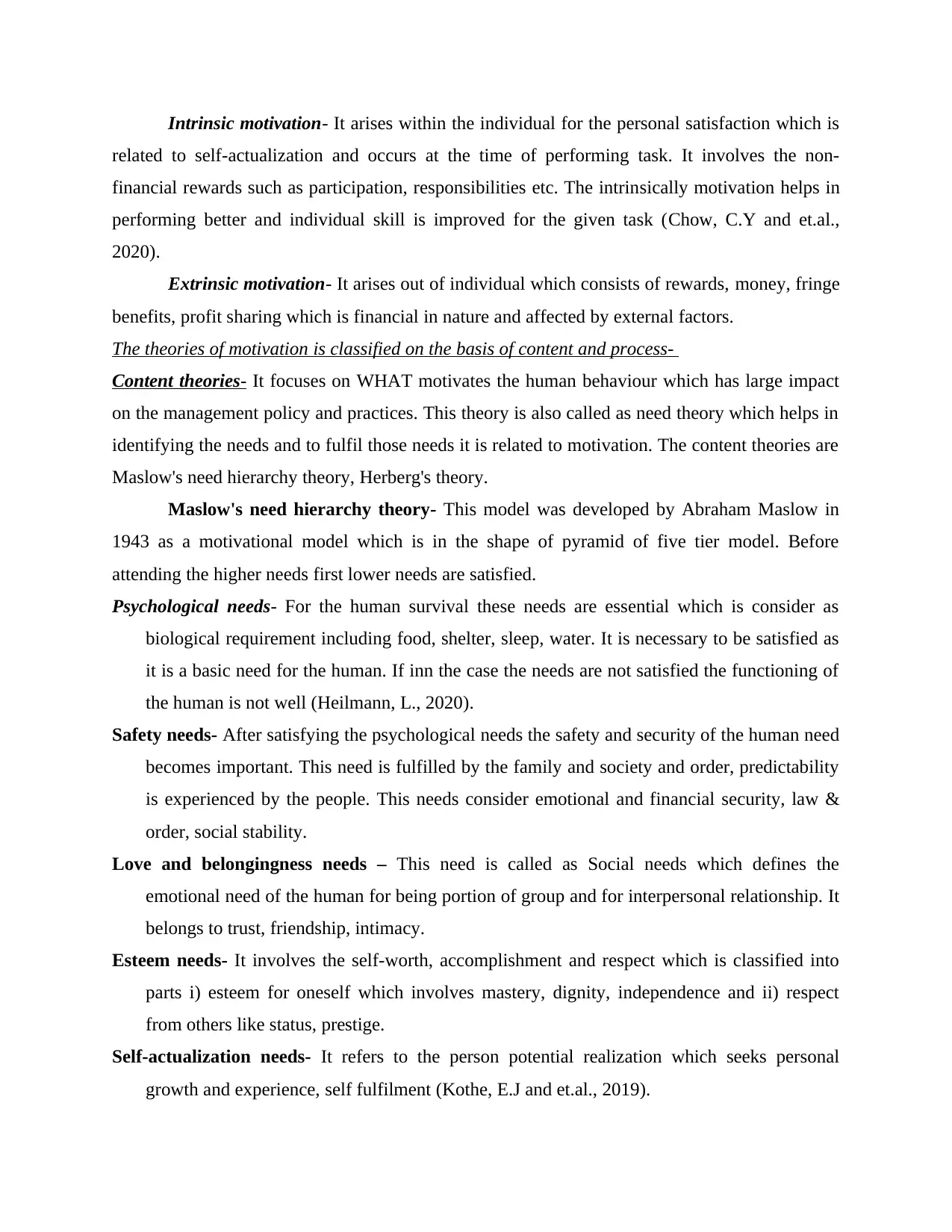
Intrinsic motivation- It arises within the individual for the personal satisfaction which is
related to self-actualization and occurs at the time of performing task. It involves the non-
financial rewards such as participation, responsibilities etc. The intrinsically motivation helps in
performing better and individual skill is improved for the given task (Chow, C.Y and et.al.,
2020).
Extrinsic motivation- It arises out of individual which consists of rewards, money, fringe
benefits, profit sharing which is financial in nature and affected by external factors.
The theories of motivation is classified on the basis of content and process-
Content theories- It focuses on WHAT motivates the human behaviour which has large impact
on the management policy and practices. This theory is also called as need theory which helps in
identifying the needs and to fulfil those needs it is related to motivation. The content theories are
Maslow's need hierarchy theory, Herberg's theory.
Maslow's need hierarchy theory- This model was developed by Abraham Maslow in
1943 as a motivational model which is in the shape of pyramid of five tier model. Before
attending the higher needs first lower needs are satisfied.
Psychological needs- For the human survival these needs are essential which is consider as
biological requirement including food, shelter, sleep, water. It is necessary to be satisfied as
it is a basic need for the human. If inn the case the needs are not satisfied the functioning of
the human is not well (Heilmann, L., 2020).
Safety needs- After satisfying the psychological needs the safety and security of the human need
becomes important. This need is fulfilled by the family and society and order, predictability
is experienced by the people. This needs consider emotional and financial security, law &
order, social stability.
Love and belongingness needs – This need is called as Social needs which defines the
emotional need of the human for being portion of group and for interpersonal relationship. It
belongs to trust, friendship, intimacy.
Esteem needs- It involves the self-worth, accomplishment and respect which is classified into
parts i) esteem for oneself which involves mastery, dignity, independence and ii) respect
from others like status, prestige.
Self-actualization needs- It refers to the person potential realization which seeks personal
growth and experience, self fulfilment (Kothe, E.J and et.al., 2019).
related to self-actualization and occurs at the time of performing task. It involves the non-
financial rewards such as participation, responsibilities etc. The intrinsically motivation helps in
performing better and individual skill is improved for the given task (Chow, C.Y and et.al.,
2020).
Extrinsic motivation- It arises out of individual which consists of rewards, money, fringe
benefits, profit sharing which is financial in nature and affected by external factors.
The theories of motivation is classified on the basis of content and process-
Content theories- It focuses on WHAT motivates the human behaviour which has large impact
on the management policy and practices. This theory is also called as need theory which helps in
identifying the needs and to fulfil those needs it is related to motivation. The content theories are
Maslow's need hierarchy theory, Herberg's theory.
Maslow's need hierarchy theory- This model was developed by Abraham Maslow in
1943 as a motivational model which is in the shape of pyramid of five tier model. Before
attending the higher needs first lower needs are satisfied.
Psychological needs- For the human survival these needs are essential which is consider as
biological requirement including food, shelter, sleep, water. It is necessary to be satisfied as
it is a basic need for the human. If inn the case the needs are not satisfied the functioning of
the human is not well (Heilmann, L., 2020).
Safety needs- After satisfying the psychological needs the safety and security of the human need
becomes important. This need is fulfilled by the family and society and order, predictability
is experienced by the people. This needs consider emotional and financial security, law &
order, social stability.
Love and belongingness needs – This need is called as Social needs which defines the
emotional need of the human for being portion of group and for interpersonal relationship. It
belongs to trust, friendship, intimacy.
Esteem needs- It involves the self-worth, accomplishment and respect which is classified into
parts i) esteem for oneself which involves mastery, dignity, independence and ii) respect
from others like status, prestige.
Self-actualization needs- It refers to the person potential realization which seeks personal
growth and experience, self fulfilment (Kothe, E.J and et.al., 2019).
Paraphrase This Document
Need a fresh take? Get an instant paraphrase of this document with our AI Paraphraser
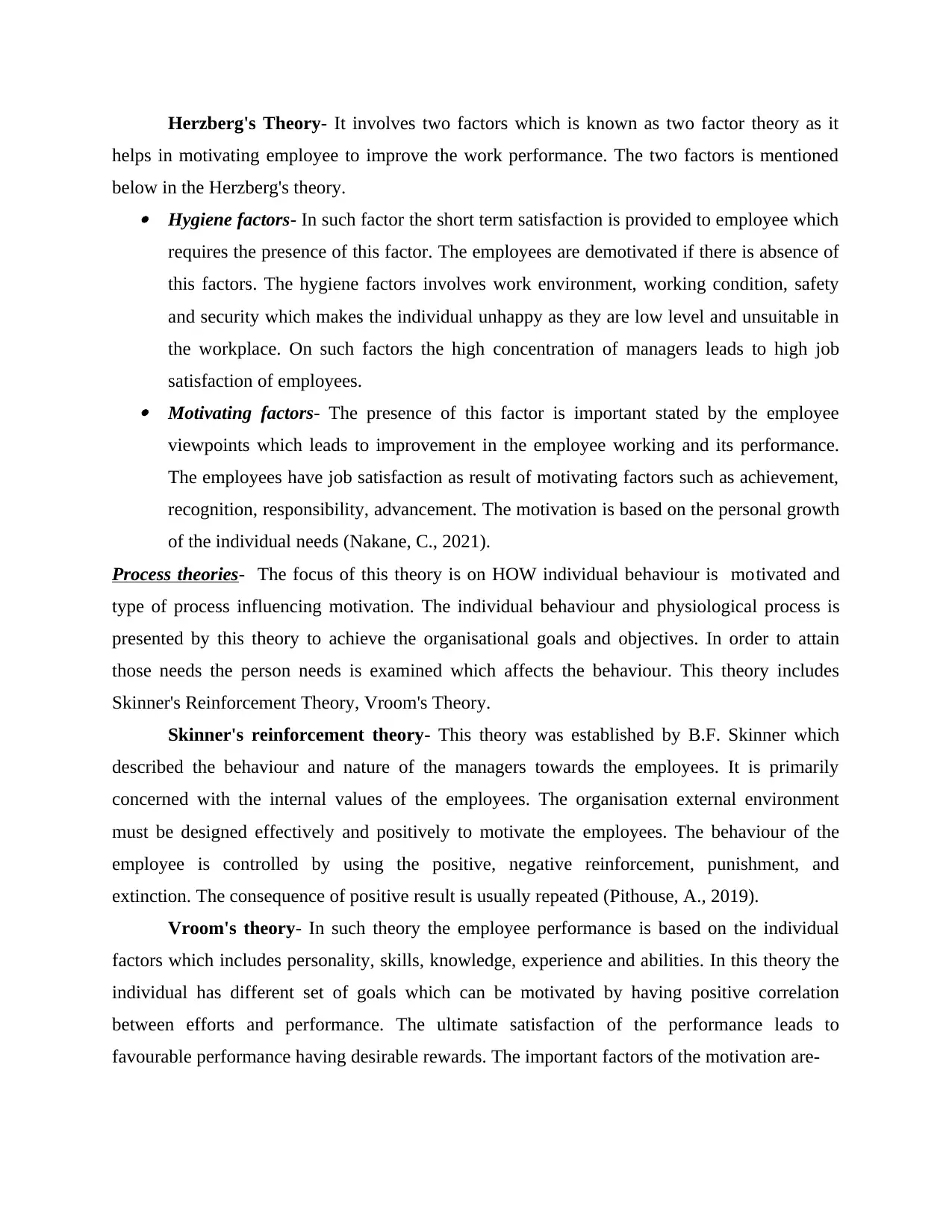
Herzberg's Theory- It involves two factors which is known as two factor theory as it
helps in motivating employee to improve the work performance. The two factors is mentioned
below in the Herzberg's theory. Hygiene factors- In such factor the short term satisfaction is provided to employee which
requires the presence of this factor. The employees are demotivated if there is absence of
this factors. The hygiene factors involves work environment, working condition, safety
and security which makes the individual unhappy as they are low level and unsuitable in
the workplace. On such factors the high concentration of managers leads to high job
satisfaction of employees. Motivating factors- The presence of this factor is important stated by the employee
viewpoints which leads to improvement in the employee working and its performance.
The employees have job satisfaction as result of motivating factors such as achievement,
recognition, responsibility, advancement. The motivation is based on the personal growth
of the individual needs (Nakane, C., 2021).
Process theories- The focus of this theory is on HOW individual behaviour is motivated and
type of process influencing motivation. The individual behaviour and physiological process is
presented by this theory to achieve the organisational goals and objectives. In order to attain
those needs the person needs is examined which affects the behaviour. This theory includes
Skinner's Reinforcement Theory, Vroom's Theory.
Skinner's reinforcement theory- This theory was established by B.F. Skinner which
described the behaviour and nature of the managers towards the employees. It is primarily
concerned with the internal values of the employees. The organisation external environment
must be designed effectively and positively to motivate the employees. The behaviour of the
employee is controlled by using the positive, negative reinforcement, punishment, and
extinction. The consequence of positive result is usually repeated (Pithouse, A., 2019).
Vroom's theory- In such theory the employee performance is based on the individual
factors which includes personality, skills, knowledge, experience and abilities. In this theory the
individual has different set of goals which can be motivated by having positive correlation
between efforts and performance. The ultimate satisfaction of the performance leads to
favourable performance having desirable rewards. The important factors of the motivation are-
helps in motivating employee to improve the work performance. The two factors is mentioned
below in the Herzberg's theory. Hygiene factors- In such factor the short term satisfaction is provided to employee which
requires the presence of this factor. The employees are demotivated if there is absence of
this factors. The hygiene factors involves work environment, working condition, safety
and security which makes the individual unhappy as they are low level and unsuitable in
the workplace. On such factors the high concentration of managers leads to high job
satisfaction of employees. Motivating factors- The presence of this factor is important stated by the employee
viewpoints which leads to improvement in the employee working and its performance.
The employees have job satisfaction as result of motivating factors such as achievement,
recognition, responsibility, advancement. The motivation is based on the personal growth
of the individual needs (Nakane, C., 2021).
Process theories- The focus of this theory is on HOW individual behaviour is motivated and
type of process influencing motivation. The individual behaviour and physiological process is
presented by this theory to achieve the organisational goals and objectives. In order to attain
those needs the person needs is examined which affects the behaviour. This theory includes
Skinner's Reinforcement Theory, Vroom's Theory.
Skinner's reinforcement theory- This theory was established by B.F. Skinner which
described the behaviour and nature of the managers towards the employees. It is primarily
concerned with the internal values of the employees. The organisation external environment
must be designed effectively and positively to motivate the employees. The behaviour of the
employee is controlled by using the positive, negative reinforcement, punishment, and
extinction. The consequence of positive result is usually repeated (Pithouse, A., 2019).
Vroom's theory- In such theory the employee performance is based on the individual
factors which includes personality, skills, knowledge, experience and abilities. In this theory the
individual has different set of goals which can be motivated by having positive correlation
between efforts and performance. The ultimate satisfaction of the performance leads to
favourable performance having desirable rewards. The important factors of the motivation are-
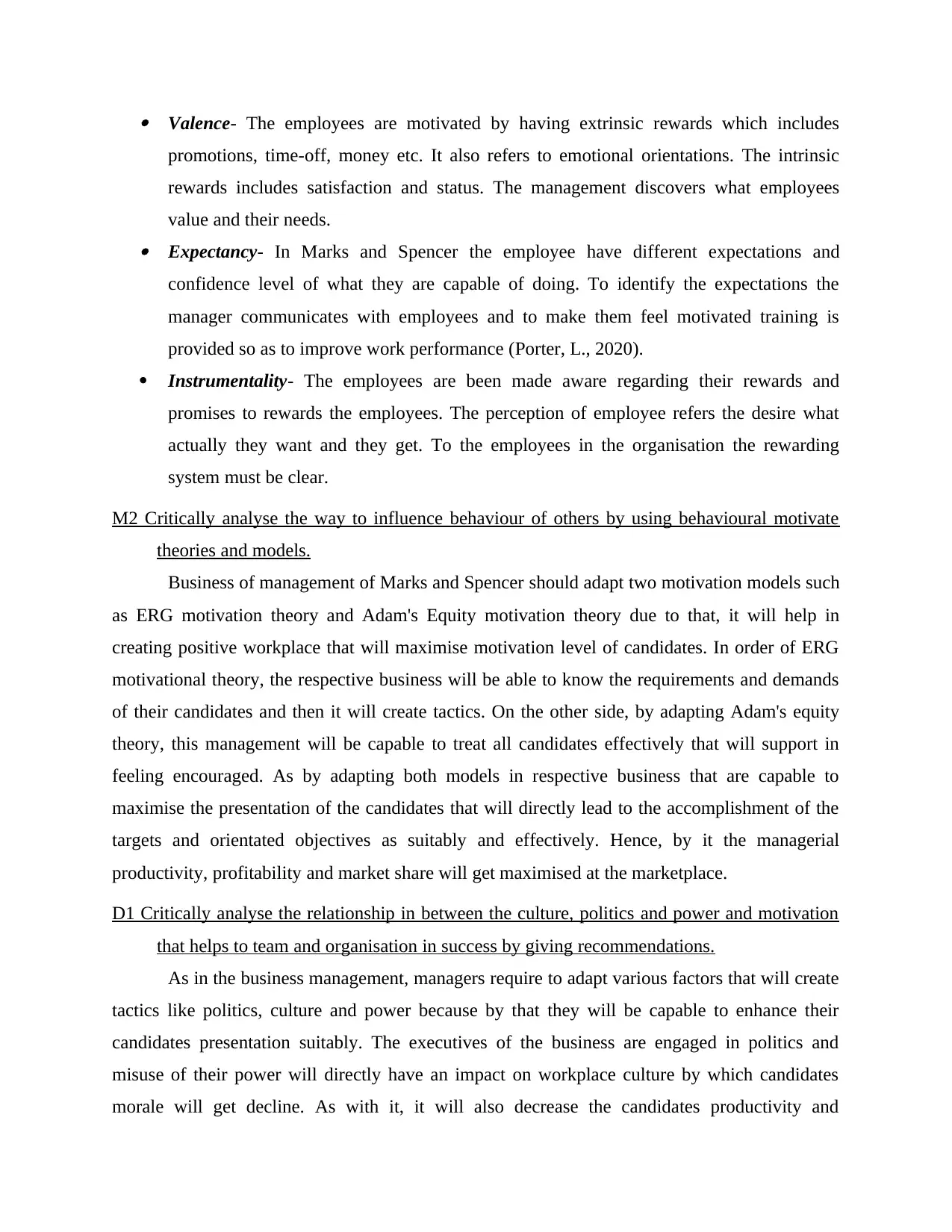
Valence- The employees are motivated by having extrinsic rewards which includes
promotions, time-off, money etc. It also refers to emotional orientations. The intrinsic
rewards includes satisfaction and status. The management discovers what employees
value and their needs. Expectancy- In Marks and Spencer the employee have different expectations and
confidence level of what they are capable of doing. To identify the expectations the
manager communicates with employees and to make them feel motivated training is
provided so as to improve work performance (Porter, L., 2020).
Instrumentality- The employees are been made aware regarding their rewards and
promises to rewards the employees. The perception of employee refers the desire what
actually they want and they get. To the employees in the organisation the rewarding
system must be clear.
M2 Critically analyse the way to influence behaviour of others by using behavioural motivate
theories and models.
Business of management of Marks and Spencer should adapt two motivation models such
as ERG motivation theory and Adam's Equity motivation theory due to that, it will help in
creating positive workplace that will maximise motivation level of candidates. In order of ERG
motivational theory, the respective business will be able to know the requirements and demands
of their candidates and then it will create tactics. On the other side, by adapting Adam's equity
theory, this management will be capable to treat all candidates effectively that will support in
feeling encouraged. As by adapting both models in respective business that are capable to
maximise the presentation of the candidates that will directly lead to the accomplishment of the
targets and orientated objectives as suitably and effectively. Hence, by it the managerial
productivity, profitability and market share will get maximised at the marketplace.
D1 Critically analyse the relationship in between the culture, politics and power and motivation
that helps to team and organisation in success by giving recommendations.
As in the business management, managers require to adapt various factors that will create
tactics like politics, culture and power because by that they will be capable to enhance their
candidates presentation suitably. The executives of the business are engaged in politics and
misuse of their power will directly have an impact on workplace culture by which candidates
morale will get decline. As with it, it will also decrease the candidates productivity and
promotions, time-off, money etc. It also refers to emotional orientations. The intrinsic
rewards includes satisfaction and status. The management discovers what employees
value and their needs. Expectancy- In Marks and Spencer the employee have different expectations and
confidence level of what they are capable of doing. To identify the expectations the
manager communicates with employees and to make them feel motivated training is
provided so as to improve work performance (Porter, L., 2020).
Instrumentality- The employees are been made aware regarding their rewards and
promises to rewards the employees. The perception of employee refers the desire what
actually they want and they get. To the employees in the organisation the rewarding
system must be clear.
M2 Critically analyse the way to influence behaviour of others by using behavioural motivate
theories and models.
Business of management of Marks and Spencer should adapt two motivation models such
as ERG motivation theory and Adam's Equity motivation theory due to that, it will help in
creating positive workplace that will maximise motivation level of candidates. In order of ERG
motivational theory, the respective business will be able to know the requirements and demands
of their candidates and then it will create tactics. On the other side, by adapting Adam's equity
theory, this management will be capable to treat all candidates effectively that will support in
feeling encouraged. As by adapting both models in respective business that are capable to
maximise the presentation of the candidates that will directly lead to the accomplishment of the
targets and orientated objectives as suitably and effectively. Hence, by it the managerial
productivity, profitability and market share will get maximised at the marketplace.
D1 Critically analyse the relationship in between the culture, politics and power and motivation
that helps to team and organisation in success by giving recommendations.
As in the business management, managers require to adapt various factors that will create
tactics like politics, culture and power because by that they will be capable to enhance their
candidates presentation suitably. The executives of the business are engaged in politics and
misuse of their power will directly have an impact on workplace culture by which candidates
morale will get decline. As with it, it will also decrease the candidates productivity and
⊘ This is a preview!⊘
Do you want full access?
Subscribe today to unlock all pages.

Trusted by 1+ million students worldwide

profitability of the business. On the other hand, the managers and leaders utilise power and
ignore the politics that will help in creating positive culture that will support in encouraging the
candidates. Hence, this will also supports in maximising of the productivity of the business as
because presentation of faculty will get improved.
P3 Explain what makes an effective team as opposed to an ineffective team.
For every successful organisation the effective team is a foundation which works together
in a team and increases productivity. To create an effective team the members must unite the
vision. The effective team helps in completion of the assigned tasks successfully by improving
its quality in efficient and effective manner. In the effective team the task of the objective is
clearly understood and accepted by all the members. In this the communication is two way with
open and accurate expressing both ideas and feelings of the employees. A team involves two or
more members to achieve a common goal by working together (Raptis, G.E and et.al., 2018). In
the organisation of Marks and Spencer to complete the work in an appropriate manner several
teams is made and there is optimum utilization of resources which brings talent and skills in
every individual of team. There is a open discussion and influencing the group. With a logical
argument the members are convinced to reach a decision. The communication is clear and shows
leadership which motivates the team members.
Ineffective team refers to the arising of conflict filled with distrust, unfocused and
negative competition. The ineffective team members do not put the much efforts which result in
workload and pressure of reaching goals successfully. In the team the trust is breakdown. It
creates the difficulty in understanding the group task and objectives. The peoples do not listen to
each other and ignores the ideas.
To have the effective team there must be mutual cooperation, individual development,
balanced role, good communication, support and trust etc. The Tuckman's team development
model explains how team is developed. It involves the four phases- Forming- It is a first stage like the orientation where the team are being introduced to
each other and everyone is pleasant and polite. In such the stage the members skills,
background, individual role and timeline is discussed. The roles and responsibilities will
begin to form and relationship is developed (Toni, M and et.al., 2018).
ignore the politics that will help in creating positive culture that will support in encouraging the
candidates. Hence, this will also supports in maximising of the productivity of the business as
because presentation of faculty will get improved.
P3 Explain what makes an effective team as opposed to an ineffective team.
For every successful organisation the effective team is a foundation which works together
in a team and increases productivity. To create an effective team the members must unite the
vision. The effective team helps in completion of the assigned tasks successfully by improving
its quality in efficient and effective manner. In the effective team the task of the objective is
clearly understood and accepted by all the members. In this the communication is two way with
open and accurate expressing both ideas and feelings of the employees. A team involves two or
more members to achieve a common goal by working together (Raptis, G.E and et.al., 2018). In
the organisation of Marks and Spencer to complete the work in an appropriate manner several
teams is made and there is optimum utilization of resources which brings talent and skills in
every individual of team. There is a open discussion and influencing the group. With a logical
argument the members are convinced to reach a decision. The communication is clear and shows
leadership which motivates the team members.
Ineffective team refers to the arising of conflict filled with distrust, unfocused and
negative competition. The ineffective team members do not put the much efforts which result in
workload and pressure of reaching goals successfully. In the team the trust is breakdown. It
creates the difficulty in understanding the group task and objectives. The peoples do not listen to
each other and ignores the ideas.
To have the effective team there must be mutual cooperation, individual development,
balanced role, good communication, support and trust etc. The Tuckman's team development
model explains how team is developed. It involves the four phases- Forming- It is a first stage like the orientation where the team are being introduced to
each other and everyone is pleasant and polite. In such the stage the members skills,
background, individual role and timeline is discussed. The roles and responsibilities will
begin to form and relationship is developed (Toni, M and et.al., 2018).
Paraphrase This Document
Need a fresh take? Get an instant paraphrase of this document with our AI Paraphraser
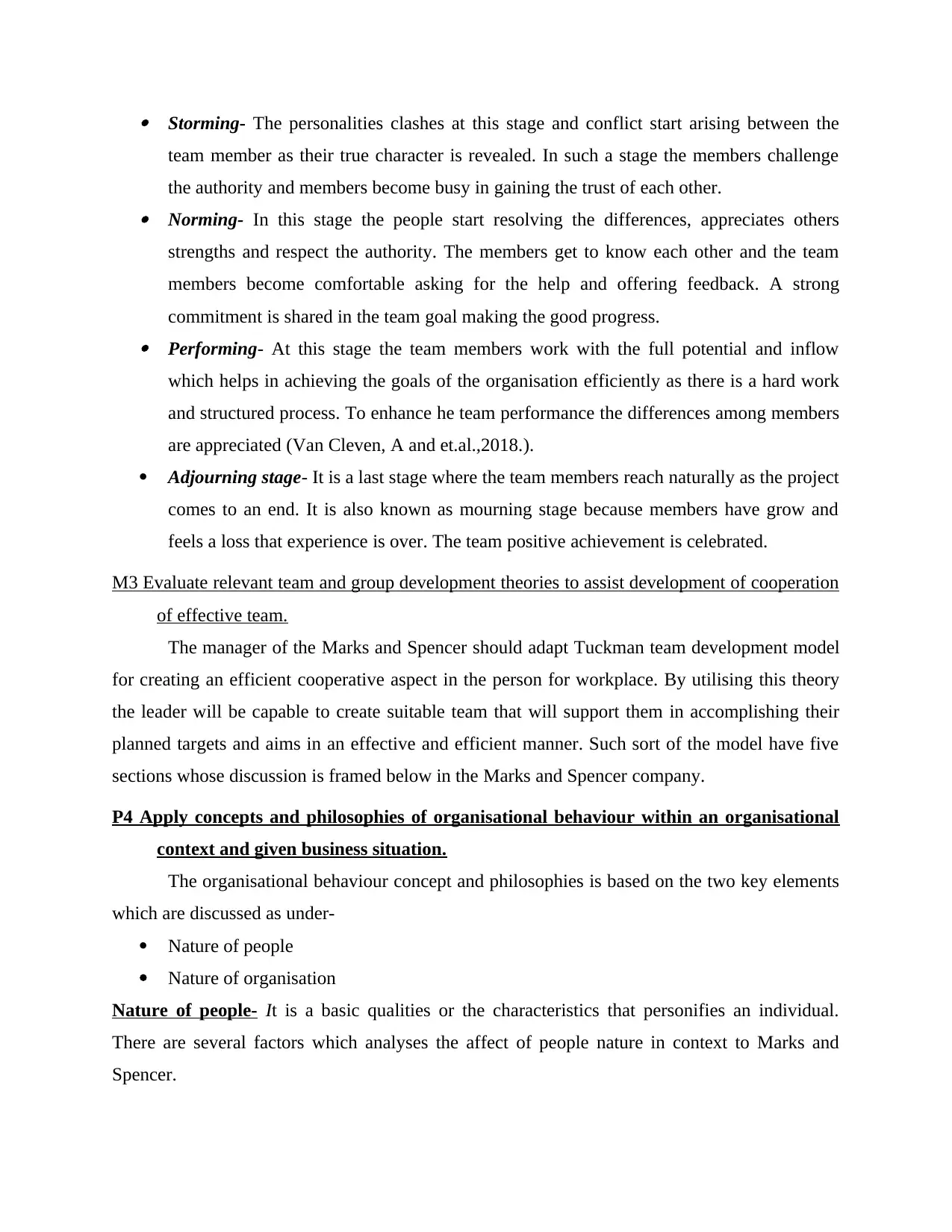
Storming- The personalities clashes at this stage and conflict start arising between the
team member as their true character is revealed. In such a stage the members challenge
the authority and members become busy in gaining the trust of each other. Norming- In this stage the people start resolving the differences, appreciates others
strengths and respect the authority. The members get to know each other and the team
members become comfortable asking for the help and offering feedback. A strong
commitment is shared in the team goal making the good progress. Performing- At this stage the team members work with the full potential and inflow
which helps in achieving the goals of the organisation efficiently as there is a hard work
and structured process. To enhance he team performance the differences among members
are appreciated (Van Cleven, A and et.al.,2018.).
Adjourning stage- It is a last stage where the team members reach naturally as the project
comes to an end. It is also known as mourning stage because members have grow and
feels a loss that experience is over. The team positive achievement is celebrated.
M3 Evaluate relevant team and group development theories to assist development of cooperation
of effective team.
The manager of the Marks and Spencer should adapt Tuckman team development model
for creating an efficient cooperative aspect in the person for workplace. By utilising this theory
the leader will be capable to create suitable team that will support them in accomplishing their
planned targets and aims in an effective and efficient manner. Such sort of the model have five
sections whose discussion is framed below in the Marks and Spencer company.
P4 Apply concepts and philosophies of organisational behaviour within an organisational
context and given business situation.
The organisational behaviour concept and philosophies is based on the two key elements
which are discussed as under-
Nature of people
Nature of organisation
Nature of people- It is a basic qualities or the characteristics that personifies an individual.
There are several factors which analyses the affect of people nature in context to Marks and
Spencer.
team member as their true character is revealed. In such a stage the members challenge
the authority and members become busy in gaining the trust of each other. Norming- In this stage the people start resolving the differences, appreciates others
strengths and respect the authority. The members get to know each other and the team
members become comfortable asking for the help and offering feedback. A strong
commitment is shared in the team goal making the good progress. Performing- At this stage the team members work with the full potential and inflow
which helps in achieving the goals of the organisation efficiently as there is a hard work
and structured process. To enhance he team performance the differences among members
are appreciated (Van Cleven, A and et.al.,2018.).
Adjourning stage- It is a last stage where the team members reach naturally as the project
comes to an end. It is also known as mourning stage because members have grow and
feels a loss that experience is over. The team positive achievement is celebrated.
M3 Evaluate relevant team and group development theories to assist development of cooperation
of effective team.
The manager of the Marks and Spencer should adapt Tuckman team development model
for creating an efficient cooperative aspect in the person for workplace. By utilising this theory
the leader will be capable to create suitable team that will support them in accomplishing their
planned targets and aims in an effective and efficient manner. Such sort of the model have five
sections whose discussion is framed below in the Marks and Spencer company.
P4 Apply concepts and philosophies of organisational behaviour within an organisational
context and given business situation.
The organisational behaviour concept and philosophies is based on the two key elements
which are discussed as under-
Nature of people
Nature of organisation
Nature of people- It is a basic qualities or the characteristics that personifies an individual.
There are several factors which analyses the affect of people nature in context to Marks and
Spencer.
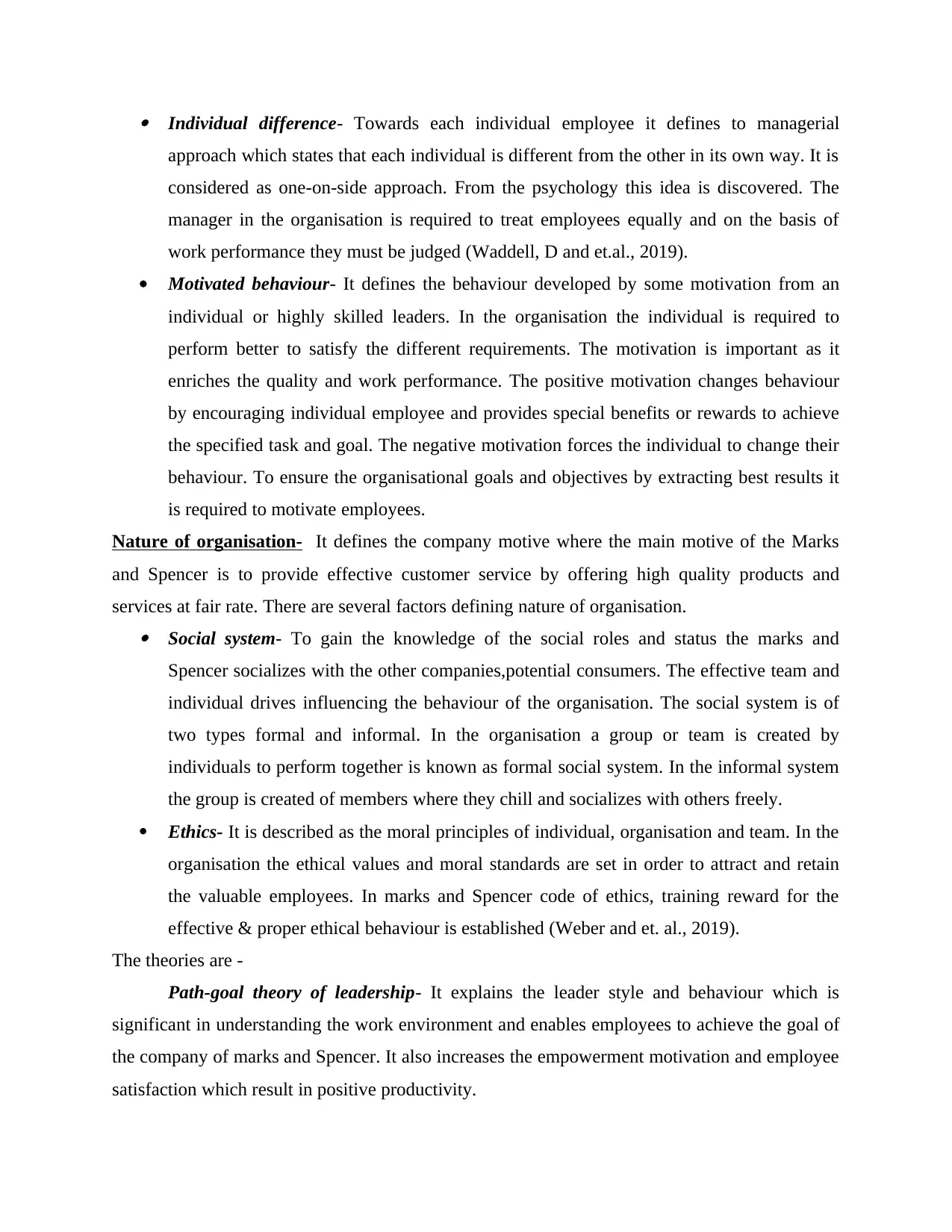
Individual difference- Towards each individual employee it defines to managerial
approach which states that each individual is different from the other in its own way. It is
considered as one-on-side approach. From the psychology this idea is discovered. The
manager in the organisation is required to treat employees equally and on the basis of
work performance they must be judged (Waddell, D and et.al., 2019).
Motivated behaviour- It defines the behaviour developed by some motivation from an
individual or highly skilled leaders. In the organisation the individual is required to
perform better to satisfy the different requirements. The motivation is important as it
enriches the quality and work performance. The positive motivation changes behaviour
by encouraging individual employee and provides special benefits or rewards to achieve
the specified task and goal. The negative motivation forces the individual to change their
behaviour. To ensure the organisational goals and objectives by extracting best results it
is required to motivate employees.
Nature of organisation- It defines the company motive where the main motive of the Marks
and Spencer is to provide effective customer service by offering high quality products and
services at fair rate. There are several factors defining nature of organisation. Social system- To gain the knowledge of the social roles and status the marks and
Spencer socializes with the other companies,potential consumers. The effective team and
individual drives influencing the behaviour of the organisation. The social system is of
two types formal and informal. In the organisation a group or team is created by
individuals to perform together is known as formal social system. In the informal system
the group is created of members where they chill and socializes with others freely.
Ethics- It is described as the moral principles of individual, organisation and team. In the
organisation the ethical values and moral standards are set in order to attract and retain
the valuable employees. In marks and Spencer code of ethics, training reward for the
effective & proper ethical behaviour is established (Weber and et. al., 2019).
The theories are -
Path-goal theory of leadership- It explains the leader style and behaviour which is
significant in understanding the work environment and enables employees to achieve the goal of
the company of marks and Spencer. It also increases the empowerment motivation and employee
satisfaction which result in positive productivity.
approach which states that each individual is different from the other in its own way. It is
considered as one-on-side approach. From the psychology this idea is discovered. The
manager in the organisation is required to treat employees equally and on the basis of
work performance they must be judged (Waddell, D and et.al., 2019).
Motivated behaviour- It defines the behaviour developed by some motivation from an
individual or highly skilled leaders. In the organisation the individual is required to
perform better to satisfy the different requirements. The motivation is important as it
enriches the quality and work performance. The positive motivation changes behaviour
by encouraging individual employee and provides special benefits or rewards to achieve
the specified task and goal. The negative motivation forces the individual to change their
behaviour. To ensure the organisational goals and objectives by extracting best results it
is required to motivate employees.
Nature of organisation- It defines the company motive where the main motive of the Marks
and Spencer is to provide effective customer service by offering high quality products and
services at fair rate. There are several factors defining nature of organisation. Social system- To gain the knowledge of the social roles and status the marks and
Spencer socializes with the other companies,potential consumers. The effective team and
individual drives influencing the behaviour of the organisation. The social system is of
two types formal and informal. In the organisation a group or team is created by
individuals to perform together is known as formal social system. In the informal system
the group is created of members where they chill and socializes with others freely.
Ethics- It is described as the moral principles of individual, organisation and team. In the
organisation the ethical values and moral standards are set in order to attract and retain
the valuable employees. In marks and Spencer code of ethics, training reward for the
effective & proper ethical behaviour is established (Weber and et. al., 2019).
The theories are -
Path-goal theory of leadership- It explains the leader style and behaviour which is
significant in understanding the work environment and enables employees to achieve the goal of
the company of marks and Spencer. It also increases the empowerment motivation and employee
satisfaction which result in positive productivity.
⊘ This is a preview!⊘
Do you want full access?
Subscribe today to unlock all pages.

Trusted by 1+ million students worldwide
1 out of 17
Related Documents
Your All-in-One AI-Powered Toolkit for Academic Success.
+13062052269
info@desklib.com
Available 24*7 on WhatsApp / Email
![[object Object]](/_next/static/media/star-bottom.7253800d.svg)
Unlock your academic potential
Copyright © 2020–2026 A2Z Services. All Rights Reserved. Developed and managed by ZUCOL.


